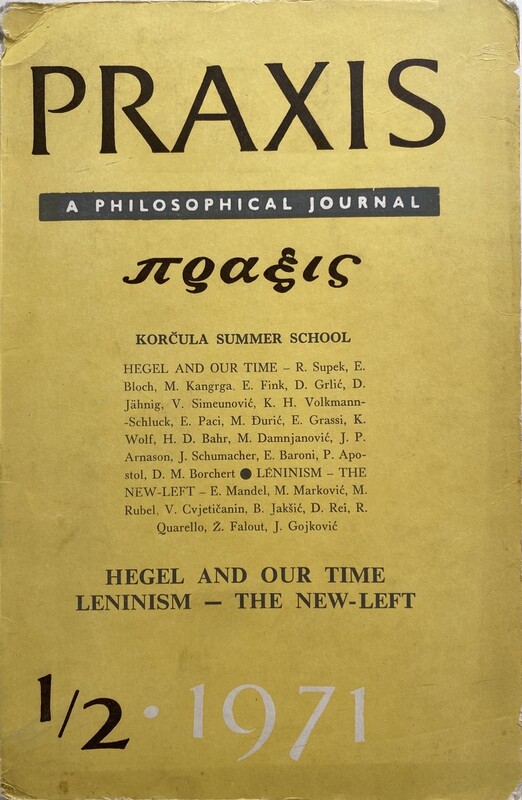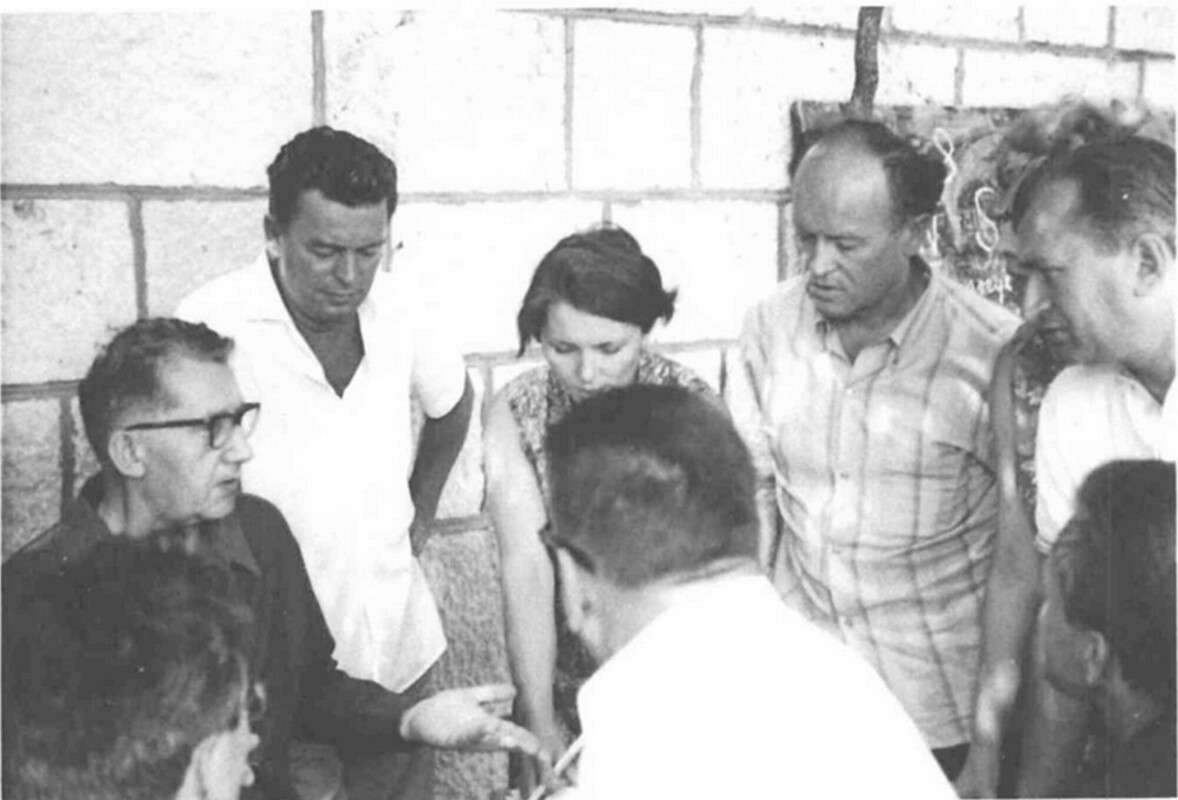Approaching Marxist humanism in Yugoslavia from the perspective of intellectual history allows us to reconstruct the complexities of this political language and to understand the existence of different discourses of humanism and human rights that emerged in the context of post-1948 Yugoslavia.
In her article “Testaments Betrayed,” Laura Secor discusses the shock of many Western academics at the swift transformations of critical, Marxist humanist intellectuals in Yugoslavia in the context of the 1980s and of the country’s violent dissolution in the 1990s. She asked: “Who could have known that one of the Praxis philosophers would later become vice president of Milosevic’s party—and its chief ideologue during the Bosnian war?”
Between 1963 and 1974, Marxist humanist intellectuals around the journal Praxis organized the international Korčula Summer School, at which they promoted critical and anti-dogmatic approaches to Marxist theory while stressing the importance of personal autonomy, dignity, moral value, freedom, and creativity. Why did some of the internationally connected and humanist-oriented intellectuals adopt integral ethnonationalist ideological and political positions? The question becomes even more interesting given the fact that the Yugoslav intellectuals, just like dissident intellectuals in East Central Europe in the 1970s and 1980s, used the language of human rights and demanded the limiting of the monopoly of power in the hands of a party and its elite. Similarly to their positions in the 1980s, Marxist humanists in Yugoslavia from the mid-1950s insisted that human emancipation could only be achieved if Marxism (and socialism) took a human being as their starting point.
Thus, two puzzles emerge when engaging with Marxists humanists in Yugoslavia: what was the path to human rights and how did they approach them, and how does the ethnonationalist political positioning of some intellectuals fit into the humanist philosophical standpoint. Two research avenues can bring us close to solving these puzzles. First, instead of approaching Marxist humanism in Yugoslavia as a stable and homogeneous intellectual position, it is important to reconstruct it as a political language that had universal horizons and included a diversity of philosophical positions that were also adapted to their own context. Second, from this perspective Marxist humanism made possible a whole spectrum of different options, some of which were disregarded and, especially in the shadow of the violent disintegration of Yugoslavia, the ethnonationalist option won out.
Transnational Encounters
Yugoslavia’s expulsion from Cominform in 1948 led intellectuals to an early engagement with existentialism, personalism, critical theory, and other philosophical streams. The critique of Stalinism was initiated by the Yugoslav leadership in its attempt at formulating a new interpretation of Marxism-Leninism. The shared position among intellectuals was that Marxism was not a dogma but a living theory that ought to be rethought and reinvigorated according to the demands and contradictions of social realities. While the Communist Party’s undertaking of the Yugoslav path to socialism—self-management—played a major role in the consciousness of the young generation of intellectuals (some had participated in the People’s Liberation War), they started to diverge in their emphasis on the importance of the individual, the existence of alienation in socialist societies (including their own), and the growing social stratification. While taking a historic step toward achieving an alternative to Western capitalism and to Soviet socialism, the Yugoslav leadership started to be criticized by some Marxist humanists for not keeping its promise of working toward a humanist socialism, or a genuine self-management.

For a decade (1963–1974) the Korčula Summer School, organized by a circle of Marxist humanists, was a meeting place for intellectuals from mainly Western countries (including the United States) but also Eastern Europe. The participants included Herbert Marcuse, Ernst Bloch, Lucien Goldmann, Ágnes Heller, Henri Lefebvre, and many others. Their growing critique of Yugoslav society focused on the ever-firmer entrenchment of the political bureaucracy through economic liberalization and foreign capital. Marcuse’s insight into the dynamics of “affluent society”—the lack of genuine freedom, the existence of various kinds of alienation in modern consumer societies—and his thematizations of the growing ontological and existential crisis of humanity faced with the development of technology analyzed by Martin Heidegger, C. Wright Mills, and others were also used, and these critiques were applied to Yugoslav socialism. While demanding that socialism must be democratic (in the sense of guaranteeing freedoms), they criticized the rise of a managerial class or technostructure reminiscent of classical bourgeoisie. Their transnational outlook positioned them critically toward capitalist and socialist industrialized societies alike as they saw in both a tendency toward social and economic organization that was run on the basis of efficiency and productivity.
Humanism(s)
In most of their debates, the Yugoslav intellectuals started from the individual, yet their interaction with different intellectual references and contexts resulted in diverging analyses, demands, and grievances.
Given such a wide array of intellectual references—and in the case of Praxis, mainly European-oriented interactions—it is impossible to talk about a homogeneous group of Yugoslav Marxists. Yet, their joint efforts could be described as humanist. In recovering the European socialist philosophical trajectory of Marxism that was lost due to Stalinist distortions, they dedicated themselves to recovering humanist aspects of Marxist thought. At the same time, what humanism meant to these intellectuals was not always clear. Competing philosophical movements had a humanistic character—personalism, phenomenology, existentialism, naturalism, and others.
Humanism was a contested concept as early as the 1950s. It circulated in various intellectual and political debates, and was shared in different academic and political milieux that often had different or contested assumptions about its meanings. At the same time, the Yugoslav Marxists saw Marxism as a cluster of diverse orientations and warned that not all of them could be seen as humanism. Freedom of thought and inquiry, freedom of speech and publication, and the rights of opposition, election, and petition were all necessary preconditions of a humane, socialist society. Marxism according to them was humanism, and its aim was to unify theory and practical action.
Analysis of the adjustment from humanist and universalist orientations toward particularist and ethnonational political and philosophical positions by some of the Yugoslav intellectuals can benefit from the discussions that question the liberal reading of human rights theory. Starting with the assumption that the meaning of human rights is not stable, it is possible to reconstruct the different paths to using the concept of human rights by the intellectuals in Yugoslavia. Looking at how their intellectual references, conceptual frameworks, and philosophical approaches developed in relation to the context in which they operated could help us understand how a universal concept of humanity became replaced by that of a particular nation.
In her study of post-Stalinist Bulgaria, Zhivka Valiavicharska convincingly illustrates how the rise of humanism opened the discursive conditions for the rise of ethnonationalism through the convergence of the humanist visions of socialist freedom and peoplehood with ethnonational monism. In the case of Yugoslav Marxists, humanism included a whole array of intellectual positions, some of which combined ethnonationalist grievances with the languages of human rights, precisely because the latter was gaining ground in the Western liberal circles and thus had a potential to exonerate what could otherwise be seen as a primordialist position.
Una Blagojević is a doctoral candidate at the History Department, Central European University and a fellow of the Southeast European Graduate Scholarship Program at the IWM (2022–2023).
